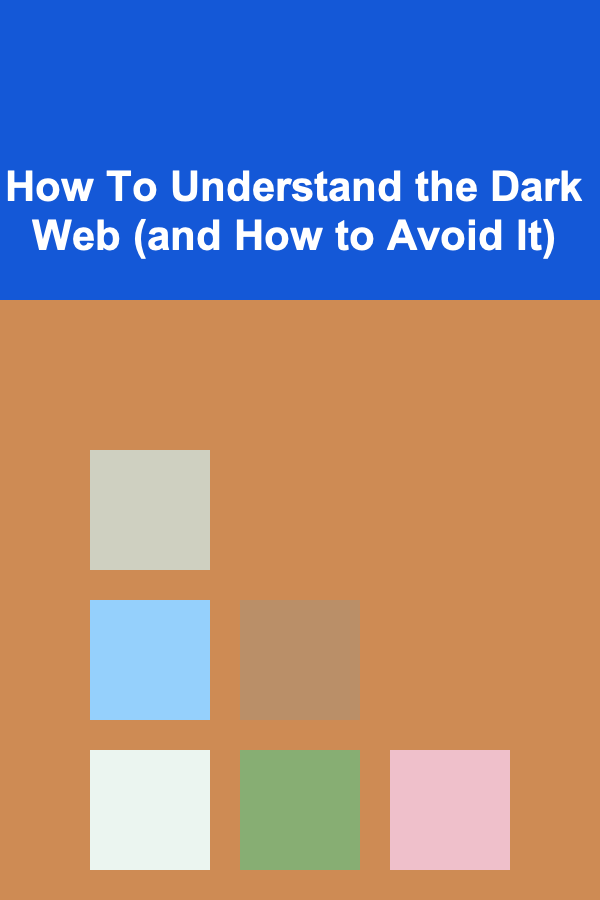
How To Understand the Dark Web (and How to Avoid It)
ebook include PDF & Audio bundle (Micro Guide)
$12.99$5.99
Limited Time Offer! Order within the next:

In today's digital world, the internet is a vast and complex ecosystem that can be divided into different layers. While most people use the surface web---the part of the internet indexed by search engines like Google---there exists a hidden underworld that is much less talked about: the dark web. For many, the dark web is an enigma, a realm that is shrouded in mystery and often associated with illicit activities. However, understanding the dark web is essential to navigating the modern internet safely and securely.
In this article, we will dive deep into what the dark web is, its components, its uses, and how to avoid falling into its often dangerous and illegal corners. Whether you are a curious internet user or a concerned parent or professional, knowing how to understand the dark web and, importantly, how to avoid it, can protect you from its risks.
What Is the Dark Web?
The dark web is a part of the deep web, which refers to all online content that is not indexed by traditional search engines like Google, Bing, or Yahoo. This content includes everything from private databases, email accounts, and private networks to certain academic papers that are hidden behind paywalls. While the deep web is not inherently dangerous or malicious, it is also not open to the public.
The dark web, however, is a subset of the deep web and can only be accessed through special software, such as Tor (The Onion Router). Tor enables users to access websites that are not indexed by conventional search engines and are often not accessible via standard browsers like Google Chrome or Safari. These websites have URLs ending in ".onion," which is part of the Tor network's encryption system that allows for anonymity.
The Technology Behind the Dark Web
To understand the dark web, it's important to first grasp the technology behind it. Tor, which stands for The Onion Router, is a decentralized network that helps users maintain their anonymity online. Tor routes internet traffic through multiple layers of encryption, hence the term "onion," because of its multi-layered structure. This process is designed to prevent anyone from tracing a user's activity back to their real-world identity.
The Tor network is open-source and free to use, and it helps maintain a level of privacy for users who are seeking to protect their personal information. However, the anonymity provided by Tor also makes it an attractive platform for illegal activities. Tor is often used by individuals trying to evade government surveillance, but it also hosts markets for illegal drugs, weapons, and other illicit services.
How the Dark Web Differs from the Deep Web
To further understand the dark web, it's important to distinguish it from the deep web. The deep web refers to all internet content that isn't indexed by search engines, but this content can include perfectly legal and harmless material. For example, private databases, subscription-based websites, or personal email accounts all reside on the deep web, but they are not inherently harmful.
The dark web, on the other hand, is a small part of the deep web that exists with the purpose of providing anonymity and privacy to its users. While the deep web is often harmless, the dark web is associated with illegal activities, such as the buying and selling of drugs, weapons, stolen data, and other illicit services. It is also a place for individuals who want to hide their identity for purposes of criminal activity or to avoid surveillance.
The Uses of the Dark Web
The dark web is often portrayed in a negative light due to its association with crime, but it is not entirely made up of illegal content. There are legitimate uses for the dark web, especially for people who require anonymity and privacy. However, the potential for abuse is significant, which is why the dark web often garners a negative reputation.
Legitimate Uses
- Whistleblowing and Political Activism: The dark web can provide a safe platform for journalists, whistleblowers, and activists living under oppressive regimes to share information and speak out against corruption or human rights abuses without fear of retaliation. Platforms like SecureDrop are used by journalists to communicate with anonymous sources safely.
- Privacy for Sensitive Communications: For individuals who are concerned about government surveillance or corporate monitoring, the dark web offers a way to communicate without fear of being tracked. Journalists, activists, and other privacy-conscious individuals can use encrypted communication channels to exchange sensitive information.
- Bypass Censorship: In some countries with strict internet censorship, individuals use the dark web to access websites and services that are otherwise blocked in their regions. The ability to bypass government-imposed firewalls can allow for greater freedom of information and expression.
Illegitimate Uses
- Illicit Markets: One of the most notorious aspects of the dark web is its use as a marketplace for illegal goods and services. These markets often trade in drugs, weapons, stolen credit card information, and even human trafficking. Though law enforcement agencies have been working to crack down on these marketplaces, they continue to thrive due to the anonymity the dark web provides.
- Hacking Services: The dark web is also home to a variety of hacking services and tools. Cybercriminals can buy and sell exploits, malware, and hacking software that can be used to break into systems and steal data. Additionally, hacking-for-hire services offer individuals the chance to engage in cyberattacks against businesses or individuals for a price.
- Stolen Data: Another prominent use of the dark web is the buying and selling of stolen personal data. Cybercriminals frequently trade personal information, including credit card numbers, social security numbers, and login credentials. This stolen data can be used for identity theft or other criminal activities.
The Dangers of the Dark Web
While the dark web offers certain advantages for those seeking privacy and anonymity, it also presents significant dangers, especially to those who are unaware of its risks. Here are some of the main dangers associated with the dark web:
1. Exposure to Illegal Content
One of the primary dangers of the dark web is the exposure to illegal content. Many websites on the dark web engage in the distribution and sale of illegal goods, including drugs, weapons, and stolen data. For those who inadvertently stumble upon these sites, there is the potential to face legal consequences for being associated with illegal activities. Even browsing these websites can sometimes put you on the radar of law enforcement agencies.
2. Cybersecurity Threats
The dark web is home to a wide range of hackers and cybercriminals, and visiting dark web sites exposes you to the risk of encountering malware, ransomware, and other malicious software. These programs are often designed to steal your personal information or install harmful software on your computer. Since dark web sites are unregulated, there is little to no protection against these threats, and your device could easily become compromised if you're not cautious.
3. Scams and Fraud
The dark web is also rife with scams and fraudulent activities. Due to its anonymity and lack of oversight, many dark web sites are simply a front for con artists looking to trick users out of their money. Fraudulent marketplaces exist where users pay for goods or services that they never receive. Because of the lack of regulation, there is little recourse for individuals who fall victim to scams on the dark web.
4. Legal Consequences
While simply visiting the dark web is not illegal, engaging in any illegal activities, such as purchasing drugs or stolen goods, is a criminal offense. Law enforcement agencies around the world actively monitor the dark web for illegal activity, and individuals caught engaging in criminal behavior may face severe legal consequences, including fines, jail time, and a criminal record.
How to Avoid the Dark Web
Given the dangers associated with the dark web, it's crucial to know how to avoid it. While the dark web is not inherently harmful, it can lead you into illegal or risky situations if you're not careful. Here are some tips for avoiding the dark web:
1. Be Cautious When Using Anonymity Tools
Tools like Tor are designed to help you maintain anonymity online, but they also give you access to the dark web. If you don't have a specific reason to use Tor, it's best to avoid using it altogether. Stick to more common browsers like Google Chrome, Firefox, or Safari to ensure that you stay on the surface web.
2. Use Reliable and Trusted Websites
Avoid clicking on links or downloading files from unreliable sources. If you're not sure whether a website is trustworthy, it's better to err on the side of caution and avoid it. Stick to well-known websites with verified security protocols.
3. Stay Informed About Online Risks
To avoid falling into dangerous or illegal corners of the internet, stay informed about online risks and how to protect yourself. Educate yourself about online security, the dark web, and how to protect your privacy. This will make it easier to recognize suspicious activity and avoid dangerous situations.
4. Use Internet Safety Tools
Consider using safety tools, such as VPNs (Virtual Private Networks) and antivirus software, to protect yourself from online threats. VPNs can help you hide your IP address and encrypt your internet traffic, while antivirus software can help detect and block harmful files and websites.
Conclusion
The dark web is a complex and often misunderstood part of the internet. While it serves a legitimate purpose for individuals seeking privacy and anonymity, it is also home to a range of illegal activities and dangers. Understanding the dark web is key to navigating it safely, and it's crucial to take precautions to avoid falling into its risky corners.
By staying informed, using reliable tools, and practicing caution, you can protect yourself from the dangers of the dark web and enjoy a safer, more secure online experience.
Reading More From Our Other Websites
- [Star Gazing Tip 101] How to Calibrate Your Telescope for Accurate Star‑Gazing Alignments
- [Personal Investment 101] How to Invest in Foreign Exchange (Forex) Markets for Profit
- [Home Cleaning 101] How to Clean a Mattress and Improve Its Lifespan
- [Home Maintenance 101] How to Maintain a Healthy Lawn: Essential Lawn Care and Landscaping Tips
- [Stamp Making Tip 101] Best Ideas for Personalized Wedding Invitation Stamps That Wow Guests
- [Home Security 101] How to Find the Best SimpliSafe Deals to Enhance Your Home Security
- [Small Business 101] How a Website Builder for Small Business Can Enhance Your Online Presence
- [Personal Financial Planning 101] How to Find Passive Income Opportunities
- [Personal Care Tips 101] How to Apply Antiperspirant Before and After a Shower
- [Personal Investment 101] How to Diversify Your Investments with Cryptocurrency

How to Budget for Health and Wellness Expenses at Home
Read More
How to Celebrate Your First Christmas in a New Home
Read More
How to Sell Vintage Vinyl Records on Discogs: A Comprehensive Actionable Guide
Read More
Why Establishing a Designated Mail Area is Important
Read More
How to Grasp the Concept of Blockchain in Crypto
Read More
10 Tips for Effective Volleyball Team Communication
Read MoreOther Products

How to Budget for Health and Wellness Expenses at Home
Read More
How to Celebrate Your First Christmas in a New Home
Read More
How to Sell Vintage Vinyl Records on Discogs: A Comprehensive Actionable Guide
Read More
Why Establishing a Designated Mail Area is Important
Read More
How to Grasp the Concept of Blockchain in Crypto
Read More